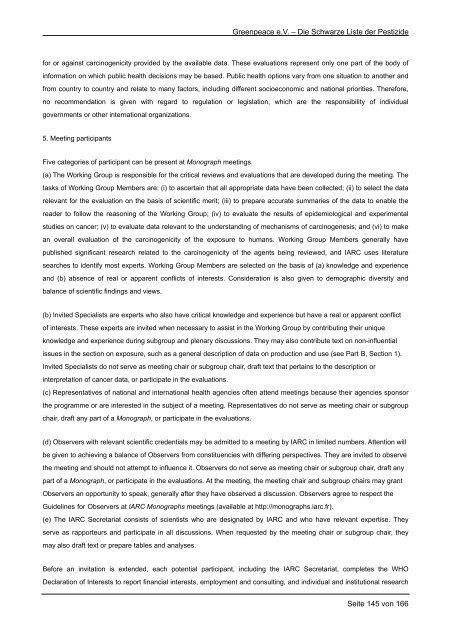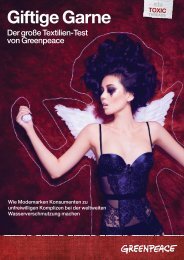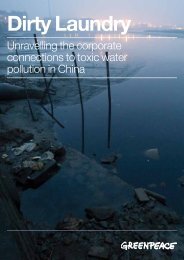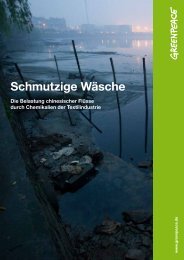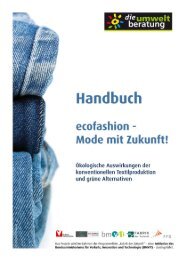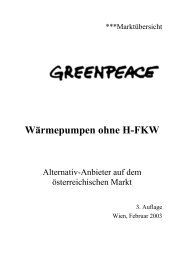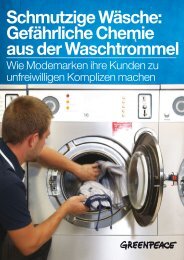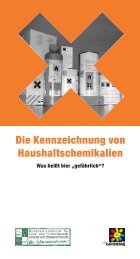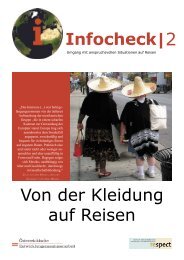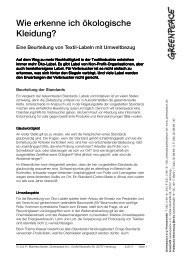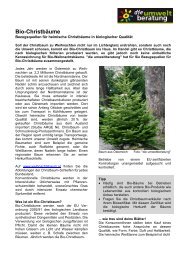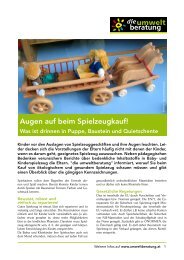Die Schwarze Liste der Pestizide - Greenpeace
Die Schwarze Liste der Pestizide - Greenpeace
Die Schwarze Liste der Pestizide - Greenpeace
Erfolgreiche ePaper selbst erstellen
Machen Sie aus Ihren PDF Publikationen ein blätterbares Flipbook mit unserer einzigartigen Google optimierten e-Paper Software.
<strong>Greenpeace</strong> e.V. – <strong>Die</strong> <strong>Schwarze</strong> <strong>Liste</strong> <strong>der</strong> <strong>Pestizide</strong><br />
for or against carcinogenicity provided by the available data. These evaluations represent only one part of the body of<br />
information on which public health decisions may be based. Public health options vary from one situation to another and<br />
from country to country and relate to many factors, including different socioeconomic and national priorities. Therefore,<br />
no recommendation is given with regard to regulation or legislation, which are the responsibility of individual<br />
governments or other international organizations.<br />
5. Meeting participants<br />
Five categories of participant can be present at Monograph meetings.<br />
(a) The Working Group is responsible for the critical reviews and evaluations that are developed during the meeting. The<br />
tasks of Working Group Members are: (i) to ascertain that all appropriate data have been collected; (ii) to select the data<br />
relevant for the evaluation on the basis of scientific merit; (iii) to prepare accurate summaries of the data to enable the<br />
rea<strong>der</strong> to follow the reasoning of the Working Group; (iv) to evaluate the results of epidemiological and experimental<br />
studies on cancer; (v) to evaluate data relevant to the un<strong>der</strong>standing of mechanisms of carcinogenesis; and (vi) to make<br />
an overall evaluation of the carcinogenicity of the exposure to humans. Working Group Members generally have<br />
published significant research related to the carcinogenicity of the agents being reviewed, and IARC uses literature<br />
searches to identify most experts. Working Group Members are selected on the basis of (a) knowledge and experience<br />
and (b) absence of real or apparent conflicts of interests. Consi<strong>der</strong>ation is also given to demographic diversity and<br />
balance of scientific findings and views.<br />
(b) Invited Specialists are experts who also have critical knowledge and experience but have a real or apparent conflict<br />
of interests. These experts are invited when necessary to assist in the Working Group by contributing their unique<br />
knowledge and experience during subgroup and plenary discussions. They may also contribute text on non-influential<br />
issues in the section on exposure, such as a general description of data on production and use (see Part B, Section 1).<br />
Invited Specialists do not serve as meeting chair or subgroup chair, draft text that pertains to the description or<br />
interpretation of cancer data, or participate in the evaluations.<br />
(c) Representatives of national and international health agencies often attend meetings because their agencies sponsor<br />
the programme or are interested in the subject of a meeting. Representatives do not serve as meeting chair or subgroup<br />
chair, draft any part of a Monograph, or participate in the evaluations.<br />
(d) Observers with relevant scientific credentials may be admitted to a meeting by IARC in limited numbers. Attention will<br />
be given to achieving a balance of Observers from constituencies with differing perspectives. They are invited to observe<br />
the meeting and should not attempt to influence it. Observers do not serve as meeting chair or subgroup chair, draft any<br />
part of a Monograph, or participate in the evaluations. At the meeting, the meeting chair and subgroup chairs may grant<br />
Observers an opportunity to speak, generally after they have observed a discussion. Observers agree to respect the<br />
Guidelines for Observers at IARC Monographs meetings (available at http://monographs.iarc.fr).<br />
(e) The IARC Secretariat consists of scientists who are designated by IARC and who have relevant expertise. They<br />
serve as rapporteurs and participate in all discussions. When requested by the meeting chair or subgroup chair, they<br />
may also draft text or prepare tables and analyses.<br />
Before an invitation is extended, each potential participant, including the IARC Secretariat, completes the WHO<br />
Declaration of Interests to report financial interests, employment and consulting, and individual and institutional research<br />
Seite 145 von 166


